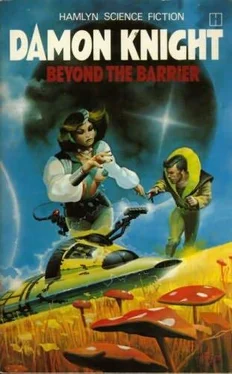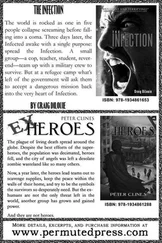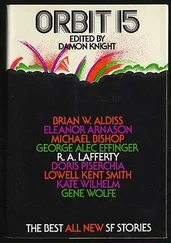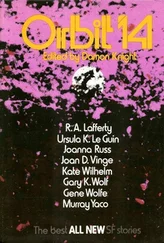Damon Knight - Beyond the Barrier
Здесь есть возможность читать онлайн «Damon Knight - Beyond the Barrier» весь текст электронной книги совершенно бесплатно (целиком полную версию без сокращений). В некоторых случаях можно слушать аудио, скачать через торрент в формате fb2 и присутствует краткое содержание. Год выпуска: 1964, Жанр: Фантастика и фэнтези, на английском языке. Описание произведения, (предисловие) а так же отзывы посетителей доступны на портале библиотеки ЛибКат.
- Название:Beyond the Barrier
- Автор:
- Жанр:
- Год:1964
- ISBN:нет данных
- Рейтинг книги:3 / 5. Голосов: 1
-
Избранное:Добавить в избранное
- Отзывы:
-
Ваша оценка:
- 60
- 1
- 2
- 3
- 4
- 5
Beyond the Barrier: краткое содержание, описание и аннотация
Предлагаем к чтению аннотацию, описание, краткое содержание или предисловие (зависит от того, что написал сам автор книги «Beyond the Barrier»). Если вы не нашли необходимую информацию о книге — напишите в комментариях, мы постараемся отыскать её.
Serialized originally in 3 parts: Dec. 1963, Jan. 1964, April 1964 editions of
Beyond the Barrier — читать онлайн бесплатно полную книгу (весь текст) целиком
Ниже представлен текст книги, разбитый по страницам. Система сохранения места последней прочитанной страницы, позволяет с удобством читать онлайн бесплатно книгу «Beyond the Barrier», без необходимости каждый раз заново искать на чём Вы остановились. Поставьте закладку, и сможете в любой момент перейти на страницу, на которой закончили чтение.
Интервал:
Закладка:
“Struggle against us,” the Lall creature had said. And he had done it; and this was the crushing result. He had killed Wells and two detectives. Now he was “ready”; he had nowhere left to go, except to Lall and Churan.
Behind him a weak, distant voice was calling. “Hey…”
came faintly over the lawns. “Hey, stop him! Stop him!
Hey…”
Naismith glanced back, saw two doll-figures emerging from the Science Building. One had white hair, and he identified it instantly as Orvile. Both running, waving their arms.
The students around Naismith turned their heads indecisively from the two figures to Naismith. Like most people, they were slow to react. Naismith turned his back on them, careful not to move too quickly, and started to walk away.
At the last moment, a husky senior blocked his path. As he opened his mouth to speak, Naismith straight-armed him and began to run. His last glimpse of the senior showed him on one leg, windmilling his arms for balance, his mouth all amazement.
Naismith sprinted. He had taken four strides when the sound he dreaded broke out behind him: a chorus of yells from many young throats; the sound of mob in pursuit.
As he ran at full speed toward the tube entrance, a second police copter was sidling down out of the sky.
Chapter Six
With the sound of the mob in his ears, Naismith ducked into the tube entrance and went down the stairs three at a time. He had one chance in a thousand. If there should be a train just pulling out.
The station was empty.
He saw that in one instant. In the next, at the edge of his vision, he saw a door open. He whirled. It was the door to a maintenance room; as it swung open, he saw it was blank except for ventilation louvers, and a number painted in white.
Inside the room, dark in a shimmer of faint colors, stood Miss Lall with Churan behind her. She held out her hand.
“Come in!”
He sprang toward the doorway, aware as he did so that there was something abnormal about the walls of the room. They were curved and insubstantial, with a soap-bubble shimmer about them; they were partly transparent. Beyond them, he could dimly make out the real walls of the room, with clothing hanging on hooks, a mop leaning against one corner.
Then he was inside. Lall sidled past him and closed the door.
Churan remained seated. The three of them looked at each other. They were enclosed and huddled together by an oval shell of transparent, streaming color. The light was strange; it was like being inside an egg made of rushing shadows.
Outside, an instant later, the rattle of footsteps and a frantic baying of voices poured down the stairs, onto the platform.
Naismith took a deep breath, let it go, relaxed deliberately with his hands at his sides. “All according to plan?” he asked ironically.
“According to plan, Mr. Naismith,” said Churan. He was seated on a stool which appeared to be part of the substance of the shadow-egg. The dancing prismatic colors streamed out from the base of this stool and disappeared at the apex of the shell over their heads.
Churan’s stubby, short-fingered hands lay casually upon the blued-steel object in his lap. With a shock, Naismith recognized the machine that had disappeared from the closet of his Beverly Hills apartment.
Churan’s eyes flickered. “We have saved your life, Mr.
Naismith,” he said hoarsely.
“All right, let’s say you did. You must have done it for some reason. Here I am. Just what is it you want?”
Lall, her eyes shining, said something swift and emphatic in a language that sounded tantalizingly familiar to Naismith—a curious combination of liquids and deep gutturals. Churan nodded, wet his lips nervously. “We want you to come with us,” he said. “A long journey, Mr. Naismith—twenty thousand years. Does that interest you?”
“What if I say no?”
Churan’s amber eyes glinted briefly. “We want you to come willingly, Mr. Naismith.”
Naismith gave a mirthless bark of laughter. “Is that why you did all this—killed Ramsdell and Mrs. Becker?”
The woman bent toward him slightly. “I’m not sure you understand, Mr. Naismith. The machine killed Mr. Ramsdell and Mrs. Becker. It is tuned to our mind patterns—yours, his and mine. You see, for anyone else, it is not safe to touch. A precaution against theft.”
Naismith felt his anger growing in spite of himself. “Are you saying that two people died just for nothing—just because you wanted to get that machine into my hands?”
“No, on the contrary,” said Churan. “Sending the machine to you was merely a device to kill Mr. Ramsdell, so that you would be suspected of murder. Our aim was to weaken your associations here. You were too well convinced that you were really Gordon Naismith.”
Outside, the noise of the crowd was dwindling; Naismith could hear isolated querulous voices calling from one end of the platform to the other. From time to time, someone would approach the maintenance room, try the knob, find it locked, and go away again.
Defeated, he made his decision. “All right, I’m ready. Let’s go.”
Lall and Churan exchanged a quick glance. Then the man’s stubby fingers moved on the surface of the machine.
Naismith watched in fascination as the inlays, which had resisted all his efforts, depressed and moved under Churan’s fingertips. As they did so, although there was no sense of motion, the walls of the maintenance room, hanging garments, mop and all, gently receded. In the act of turning, Naismith felt a psychic shock as the closed, shadowy door drifted through his own body.
Then they were moving across the station, a foot or two higher than the young men who stood in postures of arrested motion, scattered here and there about the platform. There was no sound. Every form was still, although some were caught in mid-stride. Faces were contorted, eyes glared blindly.
Moving at the same even pace, they drifted into the wall of the station. Another moment of darkness, then they emerged, on a shallow upward slant, into the open air.
Naismith watched everything with intense concentration, trying to fathom the relationship between their movements and Churan’s handling of the machine.
“What I fail to understand,” he said abruptly, “is how the energies you are using can be contained in so small a space.”
“They are not, Mr. Naismith,” said Lall with a look of respect. “The forces we use are generated in the future. This machine that you see is only the control unit. We call it—” She uttered two throaty monosyllables. “In English, what would it be?” She paused, and said doubtfully, “Time sphere? No, because it is not a sphere. But the name means something that is lowered in time, as you lower a bathysphere in the ocean. How would you say—you ought to know this, Mr. Naismith—a temporo-…?”
Outside, the bright campus was like a color transparency: the two copters, the students on the lawn, all were caught in one frozen moment. Naismith stared in fascination as the shadow-egg drifted, now more rapidly, eastward across the lawns.
Buildings, flame trees and people receded in perspective—not like a photograph now, but like some incredibly detailed and lifelike miniature model.
“Temporoscaphe?” he suggested wryly, after a moment.
“Good, temporoscaphe. But it is a very ugly word…. You see, we can control our position in both space and time. Just now, we move in space while remaining fixed in time. Later on, the other way around.”
Below, the landscape was now flowing back more rapidly.
Sunlight glinted yellow off the tip of some building on the northern horizon. Rising on a slant, they were now passing over Burwash Park. Naismith could see the gravel walks, the pedestrians frozen in place like bright-colored dolls, the silvery lake and the handball courts. It flowed away and was gone; the densely packed buildings of metropolitan Los Angeles swam into view, all in the same unearthly silence.
Читать дальшеИнтервал:
Закладка:
Похожие книги на «Beyond the Barrier»
Представляем Вашему вниманию похожие книги на «Beyond the Barrier» списком для выбора. Мы отобрали схожую по названию и смыслу литературу в надежде предоставить читателям больше вариантов отыскать новые, интересные, ещё непрочитанные произведения.
Обсуждение, отзывы о книге «Beyond the Barrier» и просто собственные мнения читателей. Оставьте ваши комментарии, напишите, что Вы думаете о произведении, его смысле или главных героях. Укажите что конкретно понравилось, а что нет, и почему Вы так считаете.










